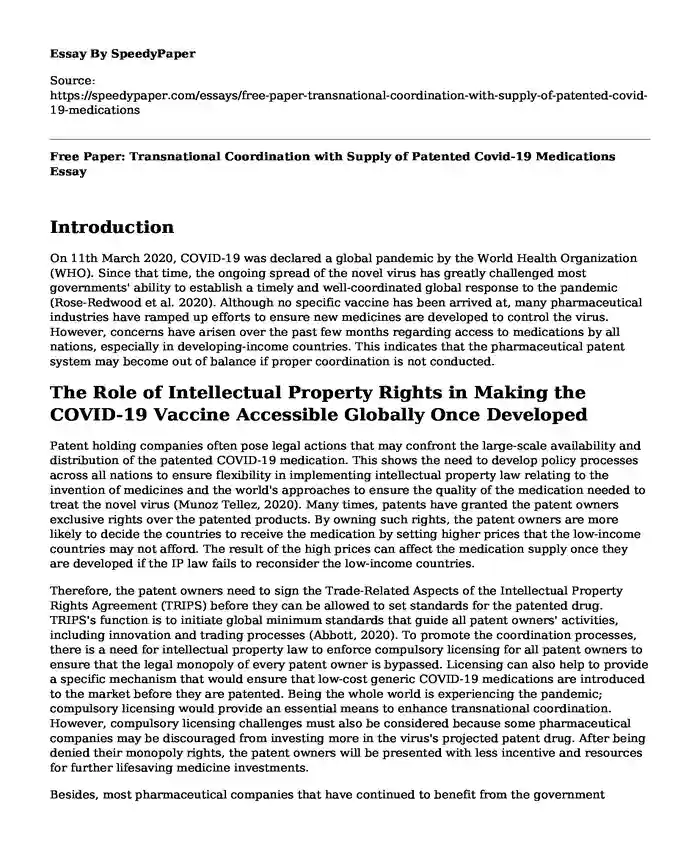Introduction
On 11th March 2020, COVID-19 was declared a global pandemic by the World Health Organization (WHO). Since that time, the ongoing spread of the novel virus has greatly challenged most governments' ability to establish a timely and well-coordinated global response to the pandemic (Rose-Redwood et al. 2020). Although no specific vaccine has been arrived at, many pharmaceutical industries have ramped up efforts to ensure new medicines are developed to control the virus. However, concerns have arisen over the past few months regarding access to medications by all nations, especially in developing-income countries. This indicates that the pharmaceutical patent system may become out of balance if proper coordination is not conducted.
The Role of Intellectual Property Rights in Making the COVID-19 Vaccine Accessible Globally Once Developed
Patent holding companies often pose legal actions that may confront the large-scale availability and distribution of the patented COVID-19 medication. This shows the need to develop policy processes across all nations to ensure flexibility in implementing intellectual property law relating to the invention of medicines and the world's approaches to ensure the quality of the medication needed to treat the novel virus (Munoz Tellez, 2020). Many times, patents have granted the patent owners exclusive rights over the patented products. By owning such rights, the patent owners are more likely to decide the countries to receive the medication by setting higher prices that the low-income countries may not afford. The result of the high prices can affect the medication supply once they are developed if the IP law fails to reconsider the low-income countries.
Therefore, the patent owners need to sign the Trade-Related Aspects of the Intellectual Property Rights Agreement (TRIPS) before they can be allowed to set standards for the patented drug. TRIPS's function is to initiate global minimum standards that guide all patent owners' activities, including innovation and trading processes (Abbott, 2020). To promote the coordination processes, there is a need for intellectual property law to enforce compulsory licensing for all patent owners to ensure that the legal monopoly of every patent owner is bypassed. Licensing can also help to provide a specific mechanism that would ensure that low-cost generic COVID-19 medications are introduced to the market before they are patented. Being the whole world is experiencing the pandemic; compulsory licensing would provide an essential means to enhance transnational coordination. However, compulsory licensing challenges must also be considered because some pharmaceutical companies may be discouraged from investing more in the virus's projected patent drug. After being denied their monopoly rights, the patent owners will be presented with less incentive and resources for further lifesaving medicine investments.
Besides, most pharmaceutical companies that have continued to benefit from the government subsidies have agreed that the sale of the projected COVID-19 vaccine will not be sold on a profit basis. This is an important decision that will play a significant role in ensuring that no nation will be charged extra money when during the supply of the medication. Therefore, even low-income countries will manage to buy as many vaccines as possible to meet the affected population's needs. However, to ensure the treatment supply is transnationally coordinated, the intellectual property law needs to address the following questions. How could the COVID-19 treatment drugs affect the drug market? What are the potential COVID-19 measures that can disrupt the supply of the treatments once they are developed? What are some of the measures that the law is putting in place to prevent drug traffickers from disrupting the treatment supply? By answering the above question, the IP law shall have ensured that the supply of the treatments is accessible to all nations.
References
Rose-Redwood, R., Kitchin, R., Apostolopoulou, E., Rickards, L., Blackman, T., Crampton, J., & Buckley, M. (2020). Geographies of the COVID-19 pandemic. Dialogues in Human Geography, 10(2), 97-106. https://doi.org/10.1177/2043820620936050
Munoz Tellez, V. (2020). The COVID-19 Pandemic: R&D and Intellectual Property Management for Access to Diagnostics, Medicines, and Vaccines. Medicines and Vaccines (April 10, 2020).
Abbott, F. M. (2020). The TRIPs Agreement Article 73 Security Exceptions and the COVID-19 Pandemic. Research Paper, 116.
Cite this page
Free Paper: Transnational Coordination with Supply of Patented Covid-19 Medications. (2024, Jan 08). Retrieved from https://speedypaper.com/essays/free-paper-transnational-coordination-with-supply-of-patented-covid-19-medications
Request Removal
If you are the original author of this essay and no longer wish to have it published on the SpeedyPaper website, please click below to request its removal:
- Essay Sample on Teaching Plan and Presentation for Acquired Pneumonia
- Speeches Samples on Teenage Pregnancy, Overpopulation Strategies, Climatic Change
- Essay Example. Abortion is Morally Wrong
- Free Essay Example - Future State Analysis
- Levy Case Study - Free Essay Example
- Learning Reasoning: Navigating Healthcare Systems for Data Presentation - Essay Sample
- Paper Exampel on Living with Back Conditions, Arthritis and Osteoporosis: Quality of Life Impact
Popular categories





